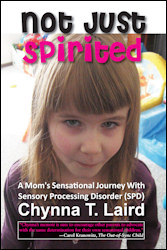Guest Blogger
Beneath the Surface – Parenting Special Needs
Chynna Laird
One of my Christmas presents last year was the glorious opportunity of “child-free shopping”. I walked through the sliding double doors of a Winners store to start some serious shopping when I heard the anguished cries of a young child.
For some reason, I felt compelled to find the source of the cries. I walked over to the girls’ clothing section to find a young woman crouched over her daughter, who rolled back and forth on the floor—her eyes screwed shut and her hands clamped over her ears. Her mother whispered to the girl: “Chandra, it’s okay. We can go. You just need to calm down a bit so that Mommy can help you up.”
The mother’s eyes welled with tears as she tried talking her daughter down from her tantrum. People walked by them—some with smiles, some laughing with empathy, others simply clicking their tongues in annoyance as if Chandra’s screams somehow interrupted their search for the ultimum after-Christmas sale. Not one person stopped to ask if things were okay or if the mother needed help and it was an eye-opening scene for me.
What that young woman went through was so familiar to me. My daughter Jaimie and my son, Xander, both live with Sensory Processing Disorder (SPD). Shopping with them has always been a challenge. We never knew, when entering a store with them, what sensory stimulations lurk in the shadows, waiting to set each of them off: a flickering light, a new smell, announcements made over the intercom, someone bumping into them accidentally… anything and everything can be a potential sensory trigger. We rarely got our shopping finished without one of them breaking down into an inconsolable fit we couldn’t calm them down from, abruptly ending our trip. And it could be quite a show for passers-by.
I remember how my face flushed as people smiled, laughed, or gave that head tilt that said, “Oh you poor thing!” I even had one lady say that all Jaimie needed was a “good spanking”. I was never embarrassed by Jaimie’s behavior, once we figured out what was wrong. And I never cared what people thought because, honestly, how could they know? How could an outside person truly understand what was happening unless they took the time to ask or, at the very least, listened as I spoke to Jaimie or Xander?
I never yelled at Jaimie or threatened her to be quiet. I never said the infamous phrase “Just you wait until I get you home, young lady!” I tried, desperately, like the young woman at Winners, to calm my child enough—to bring her focus back—so I could help her leave the “scary” place to get back to the “safer”, more familiar place. Watchers of Jaimie or Xander’s fits didn’t know it may have been their voices that set them off. Or, maybe, the house smells on their clothes Xander couldn’t deal with. Or that one flickering light off in the corner—undetectable to the untrained eye—that Jaimie wasn’t able to ignore.
With this experience under my belt, I approached the young woman—from a safe distance—and offered my help.
“No,” She said sternly. “No offense but your ‘help’ will only make things worse. Chandra can’t deal with strangers. She barely tolerates me some days. She has Autism.”
“My daughter has SPD,” I said. “I’ve had to deal with my fair share of sensory-related fits during a shopping trip.”
We talked for several minutes. I recalled how helpful it was for me having someone to talk to—a friendly voice—that calmed me down while I waited for Jaimie or Xander. It meant so much when someone cared enough to ask. I wanted to give that back to Chandra’s mother. It seemed to help a bit.
Chandra finally calmed down enough to be helped up so they could leave. Before they walked out the door, her mother touched my arm and said, “You know, it’s rare to have someone approach us the way you did and offer their help instead of treating us like we’re some free admission freak show. We appreciate it. Good luck with your kids.”
As I watched them walk out the automatic doors, two women—who’d watched from another section of the store—walked past me. One said to the other, “Man, if that had been my kid, I’d have taken her outside and tanned her hide until she stopped.”
I smiled. Most people aren’t intentionally rude; they’re simply ignorant to what it’s like having a special-needs child, especially one with sensory sensitivities. It wasn’t too long ago where I’d have thought the same things when I came across someone who struggled with their child in a store. Until I had Jaimie eight years ago, I had no clue.
There are many disorders, like Jaimie and Xander’s or Chandra’s, that aren’t obvious from the outside. What they struggle with isn’t obvious on their faces or somewhere else on their little bodies. Their disorders are buried deep within them—“invisible”—only giving a hint of their presence through the child’s overt behaviour or reactions.
It’s easy to judge a child as “naughty” or “spoiled” because they’re having a fit in a public place, but it’s not always the case. Jaimie is an average eight-year-old in a lot of respects and will still try to exert her independence or test boundaries. But I’d say about 95% of her fits are the result of her anxiety over sensory stimulation (or lack of it) or not understanding how her body is supposed to be doing something, not because we’ve said “No” to her.
Parents of special-needs children don’t want sympathy; they want understanding for their children. So the next time you see a parent struggling with their child, try looking at the situation from an omniscient standpoint. You don’t have to go up and talk to them the way I did at Winners. Simply try seeing what’s beneath the surface. That’s where understanding stems from and that’s all we want for our children.
Knowledge breeds understanding and that’s so powerful.
You can read more from Chynna Laird at her website





